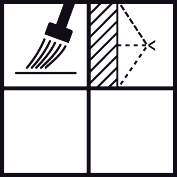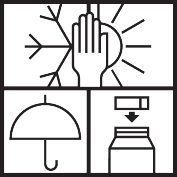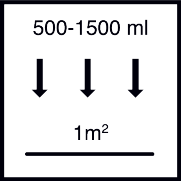Article No. 061405
Hydrophobising impregnation on a silane/siloxane base in aqueous emulsion form

Product specifications
On delivery
The stated values represent typical product characteristics and are not to be construed as binding product specifications.
Field of application
- Protection of facades against driving rain
- Reduces susceptibility to dirt and green discolouration
- Topping up old hydrophobic coatings that have been subjected to long-term weathering
- Subsequent impregnation of mineral paint coatings
- Porous, mineral building materials such as brick masonry work, sandstone/sand-lime brick, mineral renders and aerated concrete
- Mineral topcoats in thermal insulation systems
Properties
- Repels water
- Enables water vapour diffusion
- Solvent-free
- UV-resistant
- Alkali-resistant
- Excellent long-term effect
- PFAS-free formulation
- Compatible with building materials that are sensitive to solvents
-
Preparation
-
Substrate requirements
The substrate must be clean, dust-free and dry.
-
Preparations
Any construction defects such as cracks, cracked joints, defective connections, rising damp and hygroscopic moisture must be remedied in advance.
Perform any necessary cleaning gently, e.g. by spraying with cold or warm water or by steam-cleaning; use soft whirl jet technology or Remmers cleaning products (e.g. Traffic Film Remover (0671), Clean FP (0666), Clean AC (0672), Combi WR (0675)) on tough stains.
-
-
Application
-
Apply the primer abundantly by flow coating without pressure (avoid misting), so that a 30 - 50 cm long liquid film flows down the surface.
Apply horizontally on one section at a time, moving from top to bottom, and immediately go over with a wide brush.
Repeat the application several (at least two) times (wet on damp) until no further material is absorbed by the substrate.On surfaces where spray application is not possible, apply using a well-saturated brush.
-
Application instructions
-
Take appropriate measures to protect adjacent building elements and materials that should not come into contact with the product.
Protect freshly treated surfaces from driving rain, wind, sunlight and condensation.
Remove any excess impregnation agent within 1 hour using V 101 thinner.
-
-
Working tools / cleaning
-
Non-corroding, low-pressure conveying and spraying equipment, liquid pumps, paintbrush, surface brush and lamb's wool roller
-
Tools must be clean and dry.
Clean tools with water after use and before any lengthy interruptions to work.
-
Storage / shelf life
-
If stored unopened in its original container in a cool, dry place and protected against frost, the product will keep for at least 12 months.
Use the contents of open containers as quickly as possible.
-
Usage
-
Sand-lime brick, smooth: at least 0.5 l/m²
Sand-lime brick, cleft: at least 0.7 l/m²
Brick, fine pored: at least 0.8 l/m²
Brick, coarse-pored: at least 1.5 l/m²
Aerated concrete: at least 1.3 l/m²
Lightweight concrete: at least 1.0 l/m²
Natural stone, fine-pored: at least 0.8 l/m²
Natural stone, coarse-pored: at least 1.5 l/m² -
Apply to a large enough trial surface (1-2 m²) to determine the precise amount of impregnation agent required.
-
General information
-
Current regulations and legal requirements must be taken into account and deviations from these must be agreed separately.
The relevant test certificates must be observed when planning and carrying out work.
Water must not be allowed to penetrate behind the hydrophobized zone.
Carry out a quantitative analysis of aggressive salts if there are any salts present that could damage building materials.
High concentrations of harmful salts can cause major structural damage that impregnation cannot prevent.
Testing effectiveness:
The water absorption of mineral building materials can be determined using the Funcosil Test Tube developed by Professor Karsten (Funcosil Facade Testing Kit, article no. 4954).
Testing can only be carried out at the earliest 6 weeks after application.A test of effectiveness needs to be carried out on carbonaceous natural stone.
Always set up a trial area/trial areas first.
-
-
Disposal instructions
-
Larger quantities of leftover product should be disposed of in the original containers in accordance with the applicable regulations. Completely empty, clean containers should be recycled. Do not dispose of together with household waste. Do not allow to enter the sewage system. Do not empty into drains.
-
-
Safety / regulations
-
For further information on the safety aspects of transporting, storing and handling the product and on disposal and environmental matters, please see the current Safety Data Sheet.
-













